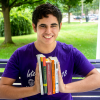As I walked down the jetway towards the plane, I reminisced about my short visit to Venezuela — and my last one to date — after my first semester at Kenyon. Since I left the country I had changed deeply, but so had Venezuela. A semester filled with adventures, new classes and experiences brought me a sense of community and belonging in a way I had not felt before, but as I boarded the plane, the scenes from my short visit to my home country still weighed on my mind.
My privilege as a Kenyon student on a scholarship contrasted with the perilous conditions and hopelessness I could feel in the streets in Venezuela. As soon as I returned to the apartment building where my family lives, an exchange with a neighbor who had always waved or asked how we were in the elevator suddenly embodied all the news I had followed online. “Merry Christmas” I said, and quickly added that I was doing fine. “I see you are doing well,” she replied. “You have gained weight.”
Hearing her words was heartbreaking. The “Freshman 15” that I had gained in a semester was now a symbol of status and wellbeing. My Freshman 15 meant that, unlike most Venezuelans who had lost weight due to the economic crisis, I was privileged enough to eat three meals a day and look a bit chubbier than I did a few months before. The joy I felt from returning to Venezuela evaporated after this jarring conversation.
Leaving Venezuela again was bittersweet, as I knew that the life I was approaching in the U.S. was very different than the one my compatriots were facing. It has been tough sometimes, as my family had to close down our cheese shop, and they remain involved in protests against the current situation. I have been awakened a couple of times by the calls of my family who have left early in the morning to join opposition protests in front of military bases and hear their stories on Whatsapp while preparing my backpack to walk towards the library mods.
Memories of my homeland are certainly an inspiration to work hard and try to help those who remain in the country as much as I can. While the crisis unfolded, friends at Kenyon would repeatedly ask me what they could do to help. I appreciated their solidarity and awareness of what was going on, but there was no way they could directly contribute to people’s causes and campaigns. GoFundMe and other fundraising platforms are not available to the everyday Venezuelan most in need, only to those with an American address or an American bank account, and even then, there are significant barriers to exchanging dollars into bolivars or transferring funds into other accounts.
Back in January, I decided to send out a Kenyon all-student email with an idea that could avoid those barriers and empower Venezuelans. I called for a meeting in Hayes Hall and told a few friends to come by. Quite a few of them showed up, and we started brainstorming a platform that would enable Venezuelans with the greatest need to tell their stories and receive the support they deserve. As we discussed the situation on the ground and brought up different sketches of what a solution could look like, we started talking to Kenyon alumni and parents, business consultants, and mentors from Fortune 500 companies.
We chose to call our project Yakera — “gratitude” in the Venezuelan indigenous language Warao — and began to develop our organization alongside students from other colleges and universities in the United States and Europe. Yakera, a safe and vetted pathway to achieve inclusive support that does not discriminate based on political membership, targets an otherwise excluded country in crisis with fundraising, stimulates the local economy, avoids institutional corruption, and allows donors and recipients to engage at a fair exchange rate using the currency that best meets their needs.
As COVID-19 hit in March 2020, the team suddenly grew. We hopped onto video calls each week, reconceptualizing our project more broadly as we were no longer tied to a physical place to meet and contacting friends and acquaintances from around the globe who might be interested in getting involved. A few weeks later, we were scheduling calls with new team members joining from England, Luxembourg and France while interviewing more Venezuelans about their experiences. The project took off as we found meaningful partnerships with local NGOs and a financial startup based in Mexico City.
Before expanding into a platform available for all Venezuelans, we have partnered with a local NGO called Nutriendo el Futuro to carry out a remote implementation in December. Though most of us will be outside of Venezuela due to travel restrictions, Nutriendo el Futuro will assist us in creating campaigns for 12 families with needs related to education, small businesses, food, and healthcare and four community projects that could generate an overall impact in the low-income neighborhood of El Calvario, Caracas.
The sentiment that initially united us — a meeting in Hayes with deep concern about the situation of the country and an attempt to find a solution — grew into a project with global connections, partnerships and compassion despite the physical distance amid the COVID-19 pandemic.
Find out more about Yakera: www.yakera.net/campaigns
Raul Romero ’22 is an international studies major from Caracas, Venezuela.
